National Security Index: Public Opinion, 2022-2023
Ruth Pines Feldman
National Security Index: Public Opinion, 2022-2023
Ruth Pines Feldman
The National Security Index, compiled by the Institute for National Security Studies (INSS), regularly and systematically tracks trends and opinions of the Israeli public on national security issues.[1] Late 2022 saw Israel with the formation of a new government, a rise in security tension and in the number of terrorist attacks, and reports of increased Iranian nuclear activity. Significantly, the latest poll echoes a trend evident in recent years, namely, the public is more worried about internal social threats within Israel than external security threats to Israel (64 percent versus 26 percent).
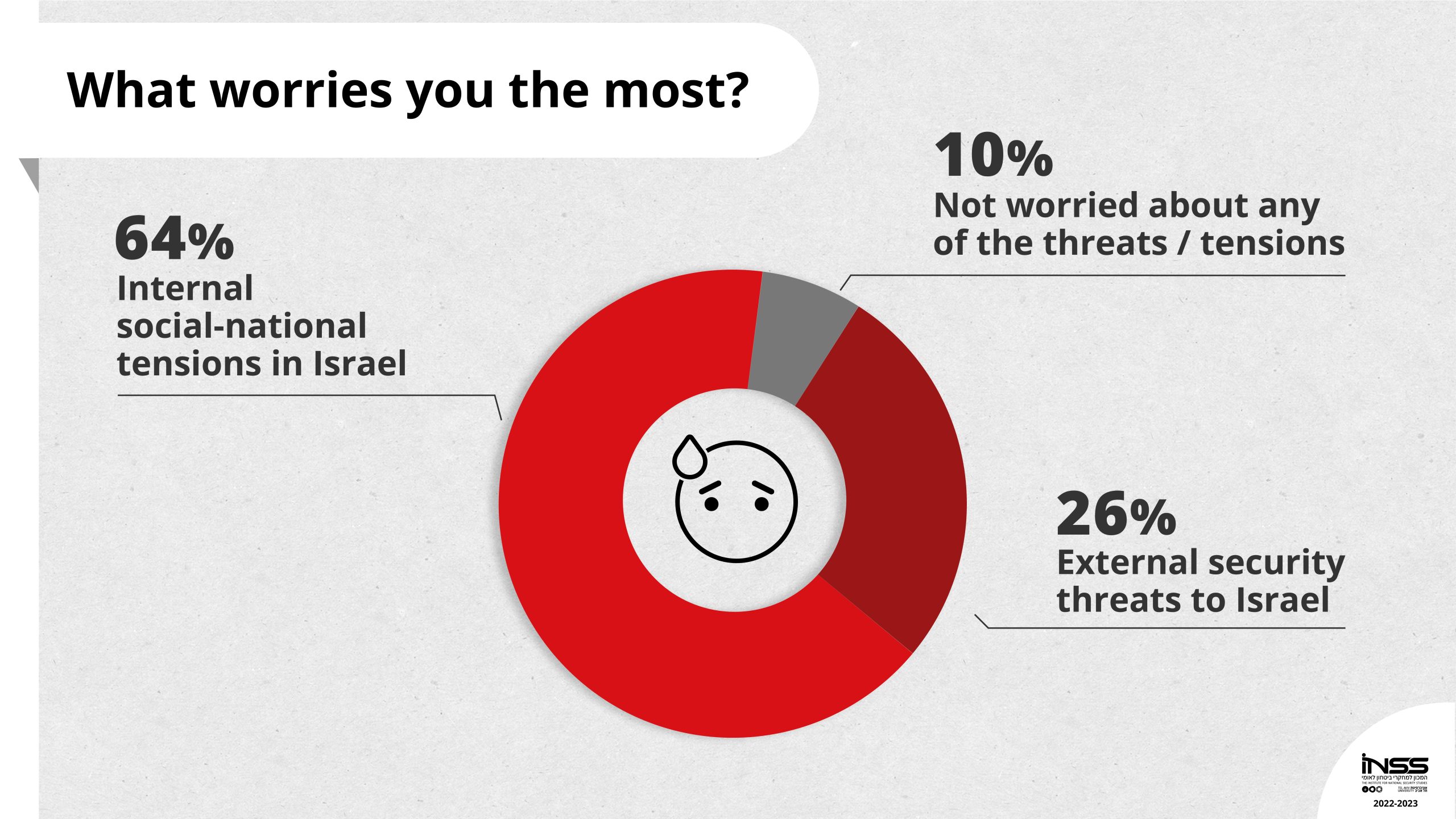
One of the main issues on the agenda in the past year was governance and the personal security of Israel’s citizens following incidents of violence on the roads, the rise in crime, and the sense of a lack of governance throughout the country. Moreover, for the first time, the public is slightly more concerned about criminal/civilian crime and violence than nationalist/security violence. Almost 60 percent of the public responded that there has recently been a decline in their sense of personal security, and they are worried about physical harm to themselves or their family members due to reckless driving on the roads (31 percent); another 14 percent were worried about they might be bystanders caught in a conflict between gangs or criminal organizations. In parallel, 30 percent expressed concern about harm to their security due to a terrorist attack, and another 14 percent expressed concern about harm due to violent riots between Arabs and Jews.
The cost of living and personal security and governance were cited by 73 percent of the public as the domestic issues to be prioritized by the incoming government (37 percent and 36 percent, respectively).
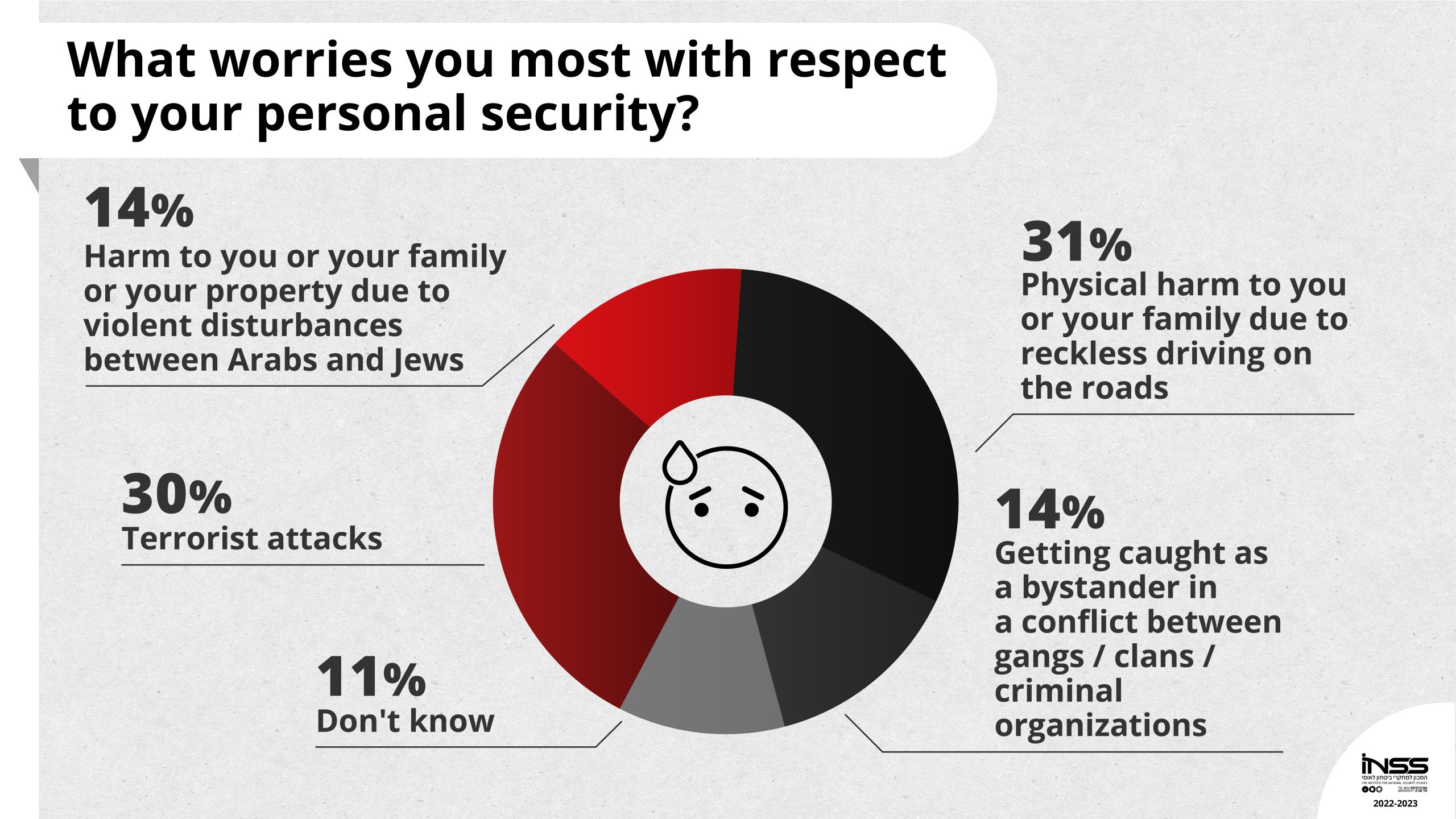
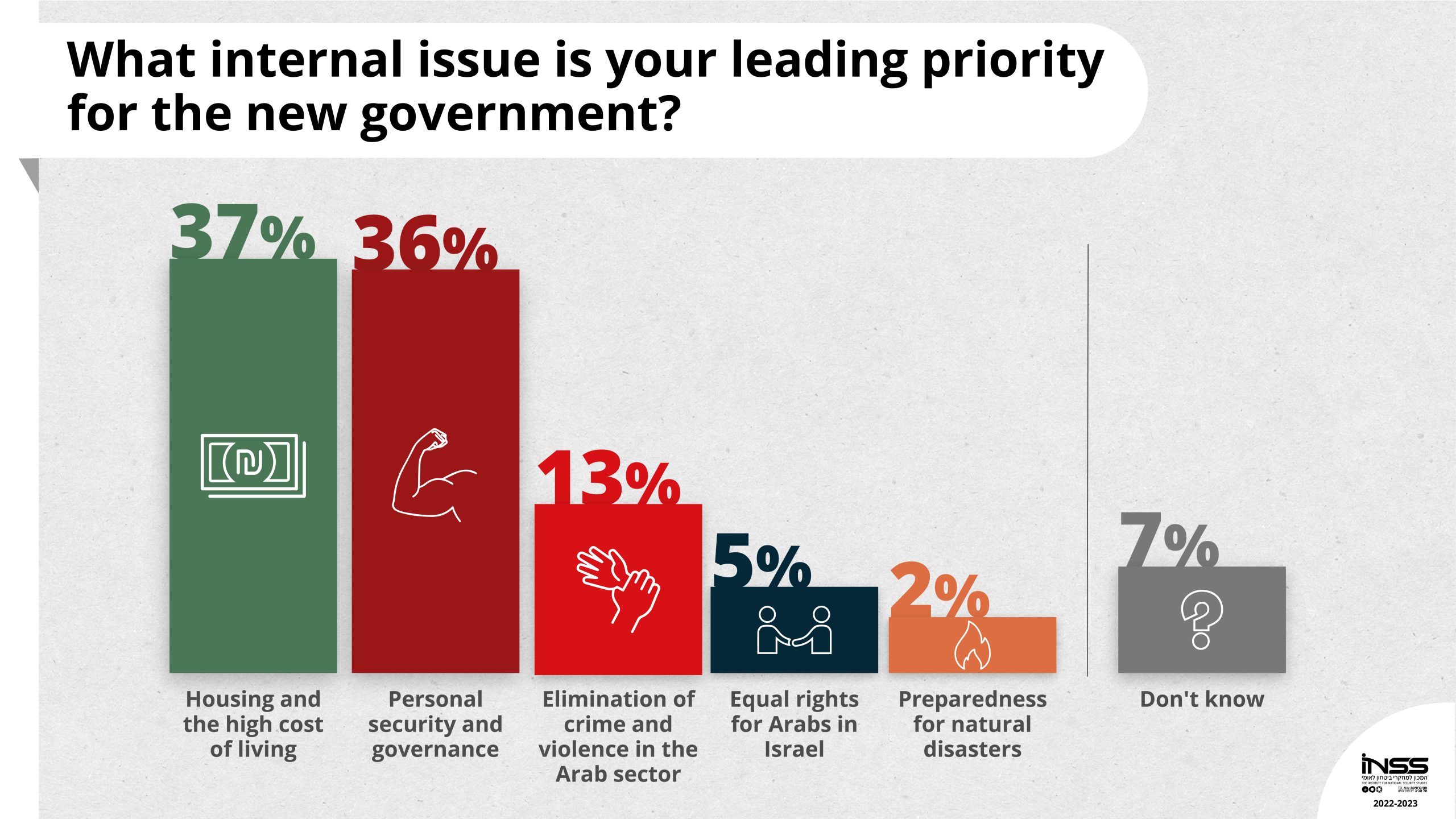
The index’s findings show that this year too, the majority of the public believed that Israel’s national security situation is reasonable, but there has been a distinct decline in this conviction over the past two years: the public gave Israel’s security situation an average score of 5.6 out of 10 (compared to an average score of 6.2 the previous year), with the number of people who believed that Israel’s security situation is “bad” rising significantly, by 10 percent (28 percent, versus 18 percent in 2021). In addition, less than a third of the public supported the claim that “Israel’s strategic situation has never been better” (31 percent compared to 36 percent in 2021 and 50 percent in 2020). Nevertheless, the public is quite optimistic with respect to the future and expects that Israel’s national security situation will improve in about five years (5.8 on average). While increasing confidence was identified in the public’s assessment of Israel’s national security situation during the years 2017-2020, peaking in 2020[2], possibly due to the Abraham Accords and the relatively quiet security situation that characterized those years, the past two years show a distinct decline trend in this assessment. This trend should continue to be tracked.
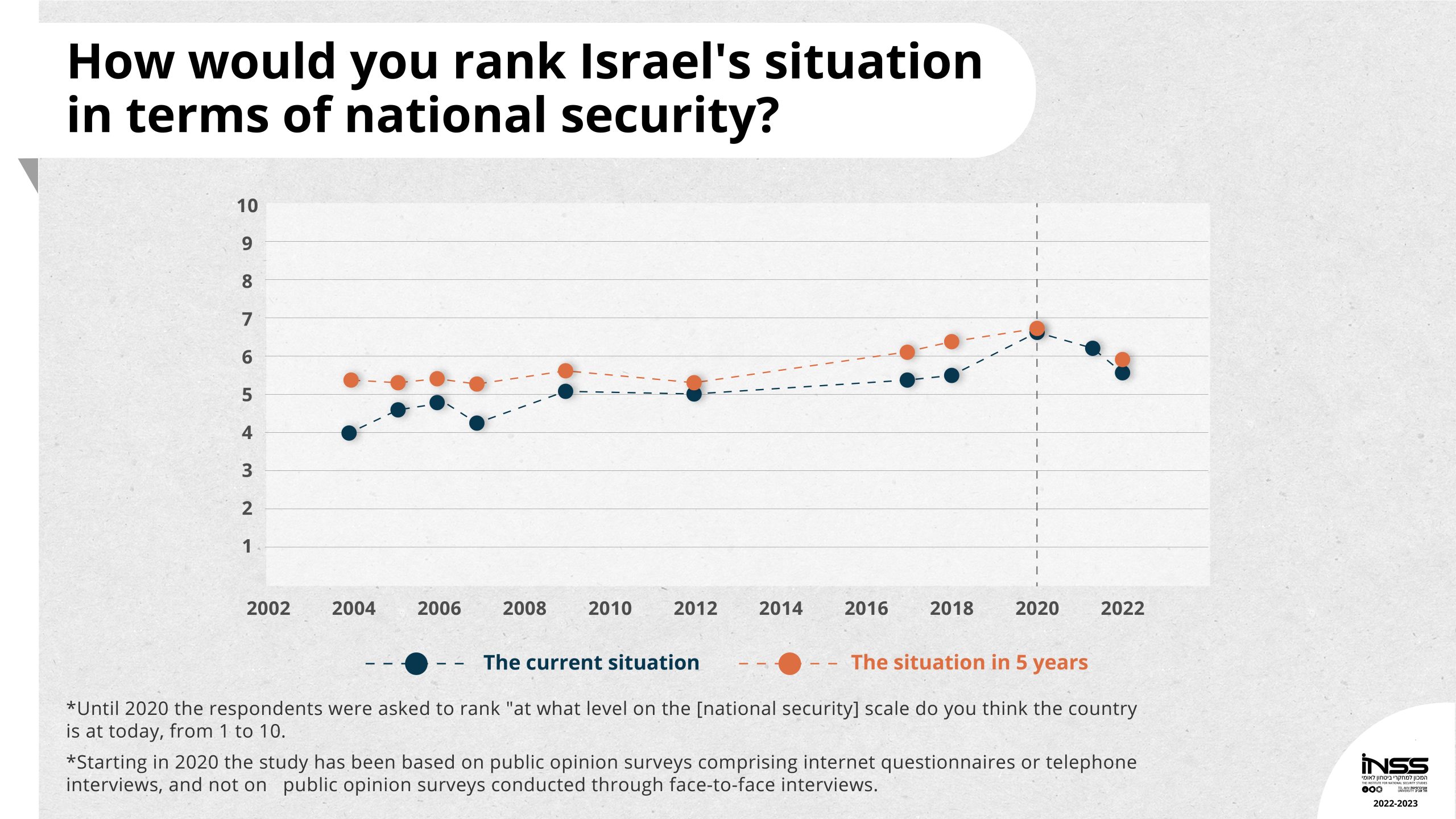
Confidence in the country’s institutions: findings show that the public’s level of confidence (Jewish and Arab) in some of the country’s institutions, and especially in the government of Israel, the police, and the judicial system, continues to be low and has declined from 2021: the government received only a 27 percent confidence level compared to 36 percent last year; the Israel Police received a low level of confidence, with only 30 percent responding that they have a high level of confidence in the organization, and only 16 percent believed that the police can successfully cope with the crime in the Arab community. Furthermore, only 28 percent responded that the police contribute to the public’s security and to law and order in the country. The public’s confidence in the judicial system also eroded, as only 41 percent of the public responded that they have a high level of confidence in the system. The public’s level of confidence in the defense organizations – the IDF, the Mossad, and the Israel Security Agency (GSS) – was relatively high, but also with respect to these institutions, which over the years have received a high level of public confidence, there was a decline in the level of public confidence compared to last year. The past few years have likewise shown a consistent moderate decline in the high level of confidence in the IDF.[3]
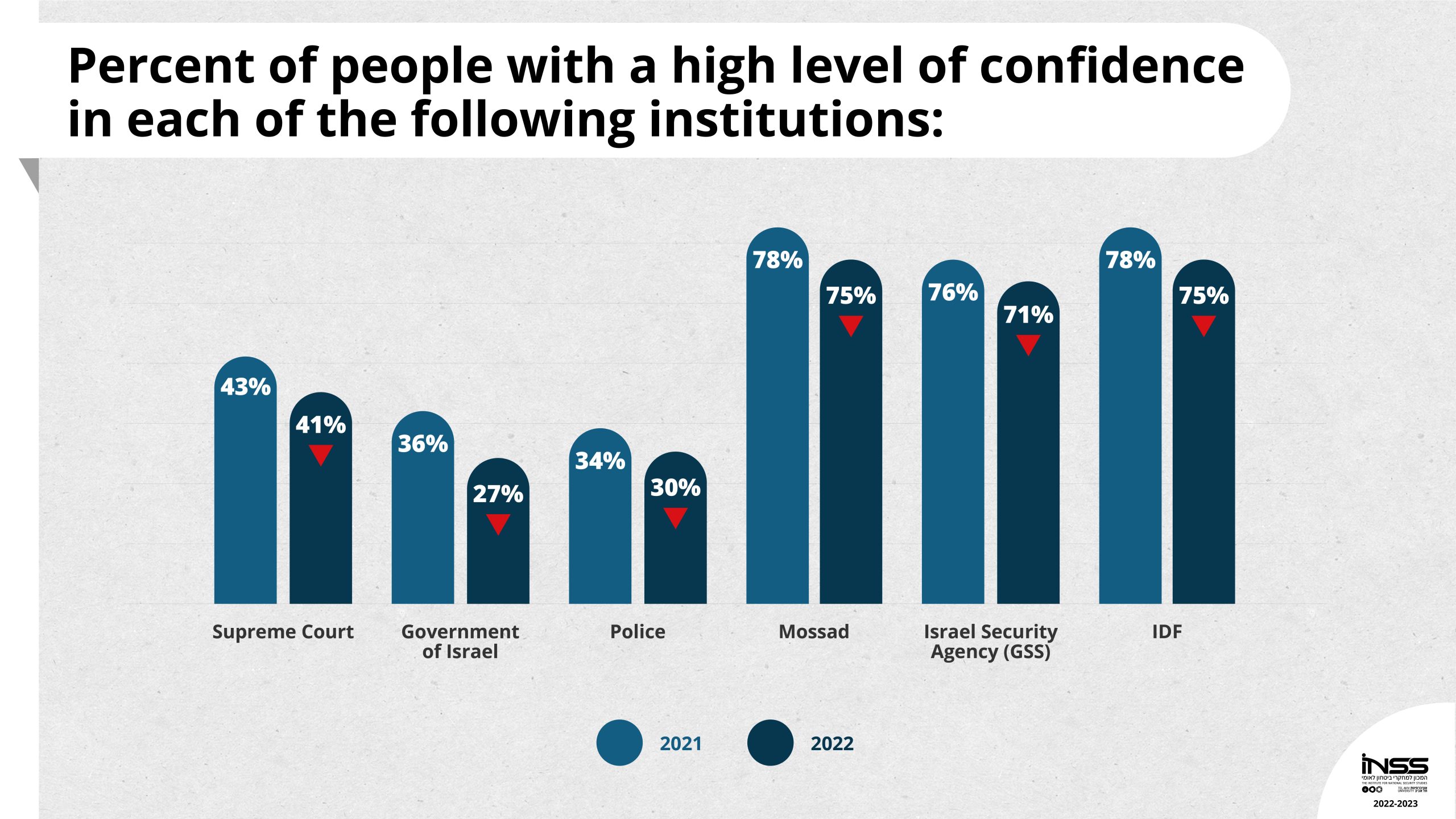
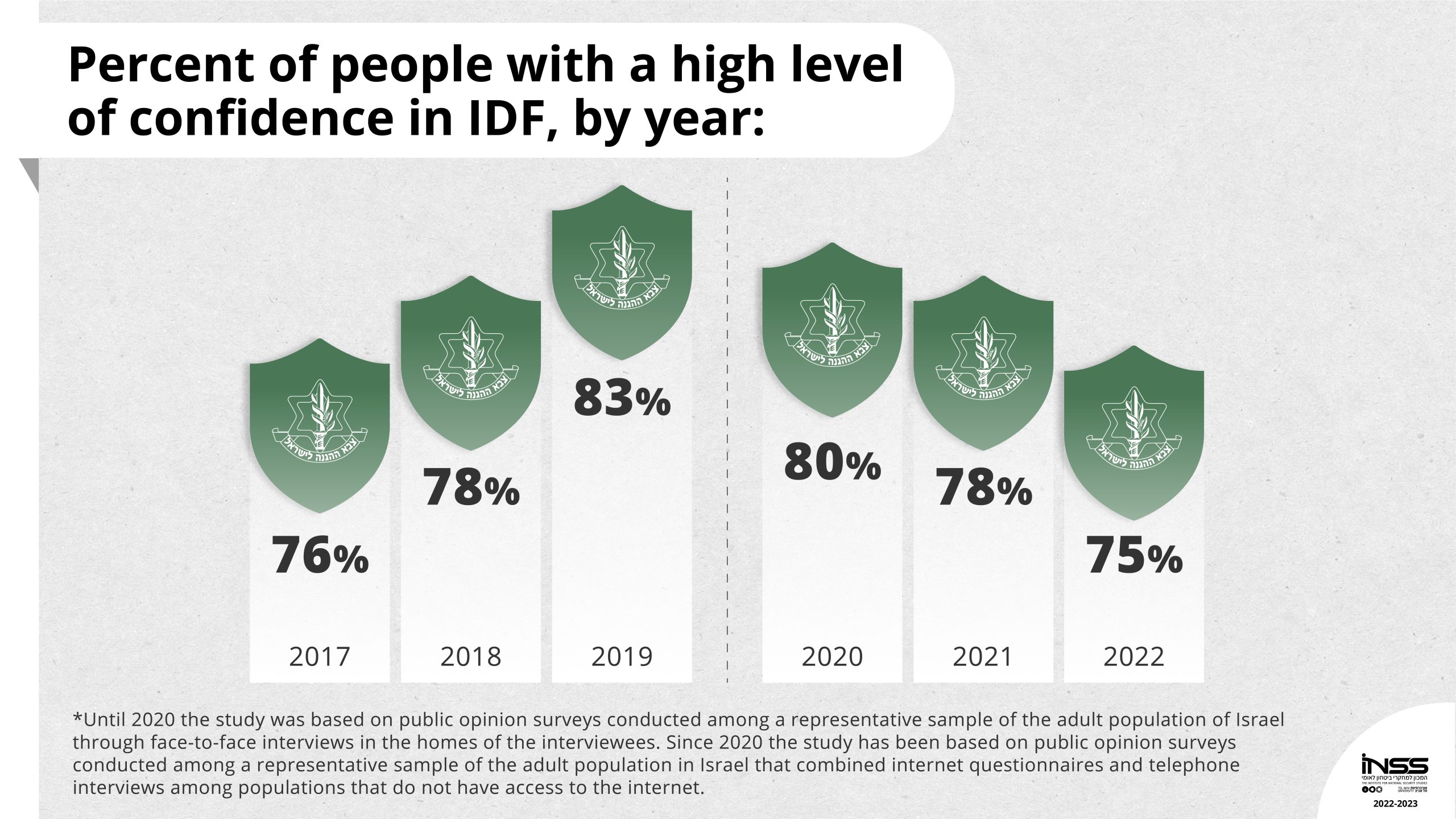
External (“Security”) Threats and Challenges
Over the years, the majority of the public has consistently felt that the State of Israel can successfully cope with external security threats, including: terrorist attacks (58 percent); security challenges related to a nuclear Iran (54 percent); a cyberattack on critical systems (68 percent); and a simultaneous escalation in the northern arena, West Bank, and Gaza (63 percent). This year saw an increase in this confidence with respect to some of the threats compared to last year. This sense of confidence in the country’s ability to cope with external security threats corresponds with the public’s perception of the IDF’s level of preparedness for successfully coping with these conflicts: 78 percent responded that the IDF is ready for war.
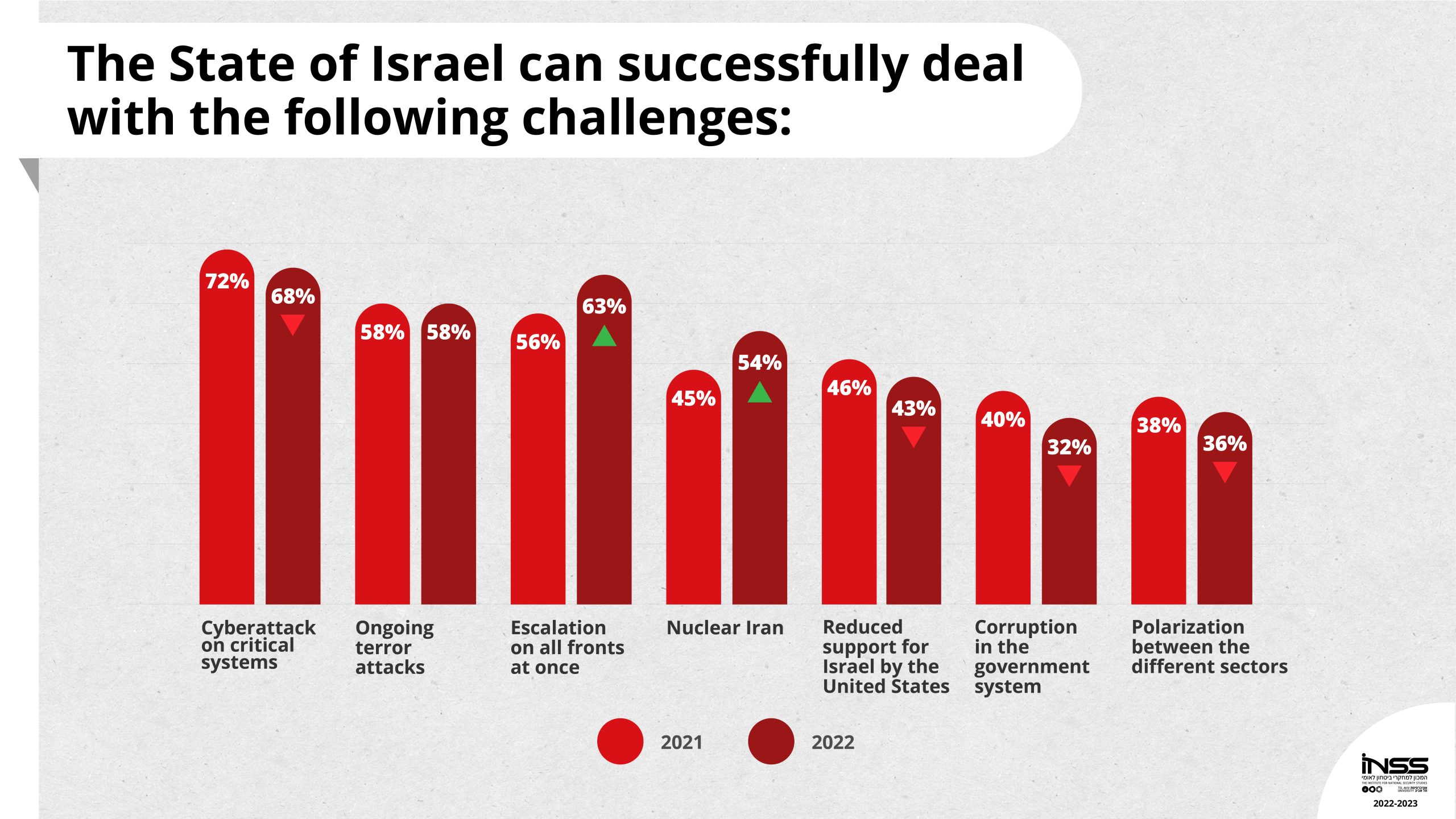
As for ranking the severity of the external threats at the end of 2022, the majority of the public – 52 percent – ranked the threat posed by the Israeli-Palestinian conflict as the most significant threat to the State of Israel today, considerably higher than the other threats. Ranked second was Iran: the nuclear program and the regional threat, with 24 percent, and the northern arena, which includes a trifold front with Syria, Lebanon, and Hezbollah, is in last place with only 10 percent; the rest responded “don’t know” (Figure 8, digital, Figure 5, pdf). Findings can be attributed to the security situation and the many terrorist attacks that Israel experienced over the past few months throughout the country, compared to the relative quiet that existed on the other fronts. An examination of the National Security Index over the years shows that the public’s perception of threats is influenced by events and developments on the ground. The figures of 2022 reflect a similar situation to what was seen in 2015 during the wave of knife terrorism, and continue the mindset from last year, when the public ranked three threats together – “the Israeli-Palestinian conflict,” “terrorist activity against Israel’s citizens” and “Hamas in Gaza” (total of 46 percent) – in first place.[4].
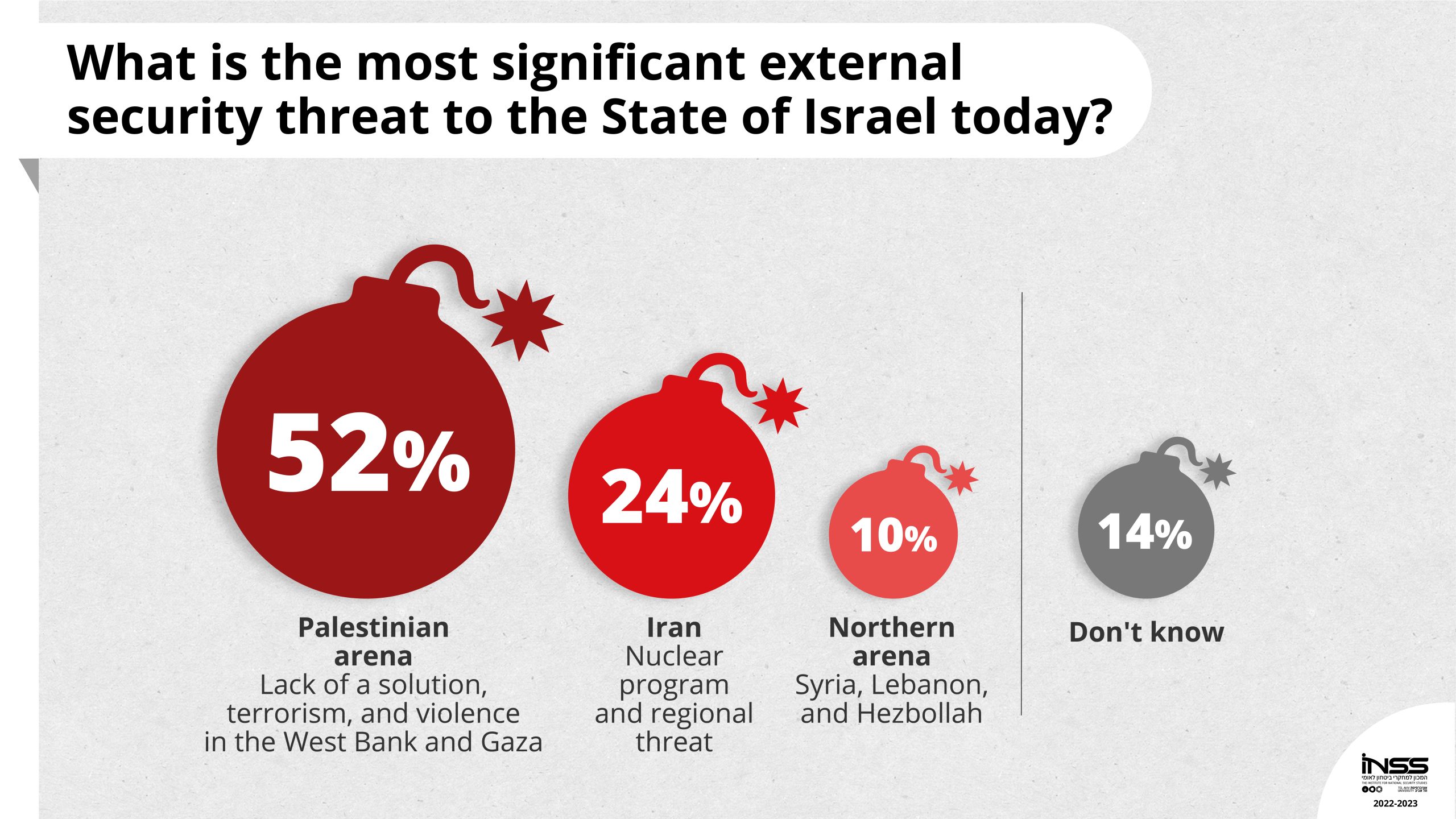
Regarding solutions to the Israeli-Palestinian conflict, in the past decade there has been a decline in support among the Jewish population for the two-state solution, from 70 percent 12 years ago to around 50 percent in late 2022. Of the overall Israeli public, 52 percent support the foundation of a Palestinian state: 40 percent support a format that restricts the characteristics of the Palestinian state: demilitarized, an undivided Jerusalem, and without “the right of return” for the Palestinians; and another 12 percent support the establishment of a Palestinian state in any situation. The majority of the public support measures to separate from the Palestinians (62 percent).
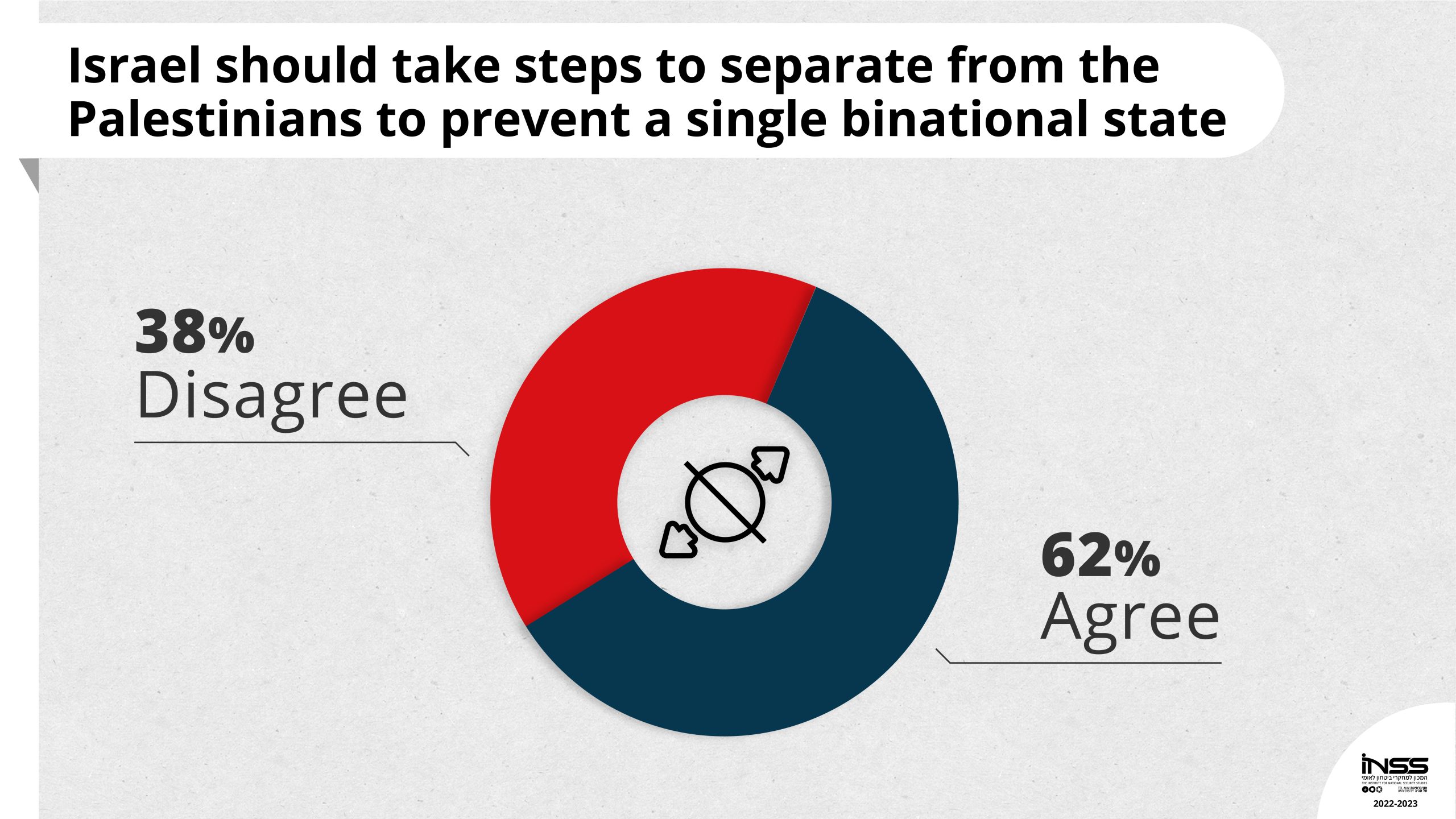
When the public was given the possibility of choosing between several different options, the preferred option was separation and striving for a comprehensive arrangement, meaning two states for two peoples: 56 percent supported this (arrangements for separating from the Palestinians – 31 percent, striving for a comprehensive arrangement, meaning two states for two peoples – 25 percent). In addition, 12 percent of respondents supported the continuation of the existing situation; 10 percent supported a binational state without giving full and equal rights to Palestinians; 5 percent supported the option of a single binational state with full and equal rights for Palestinians; and the rest responded that they don’t know.
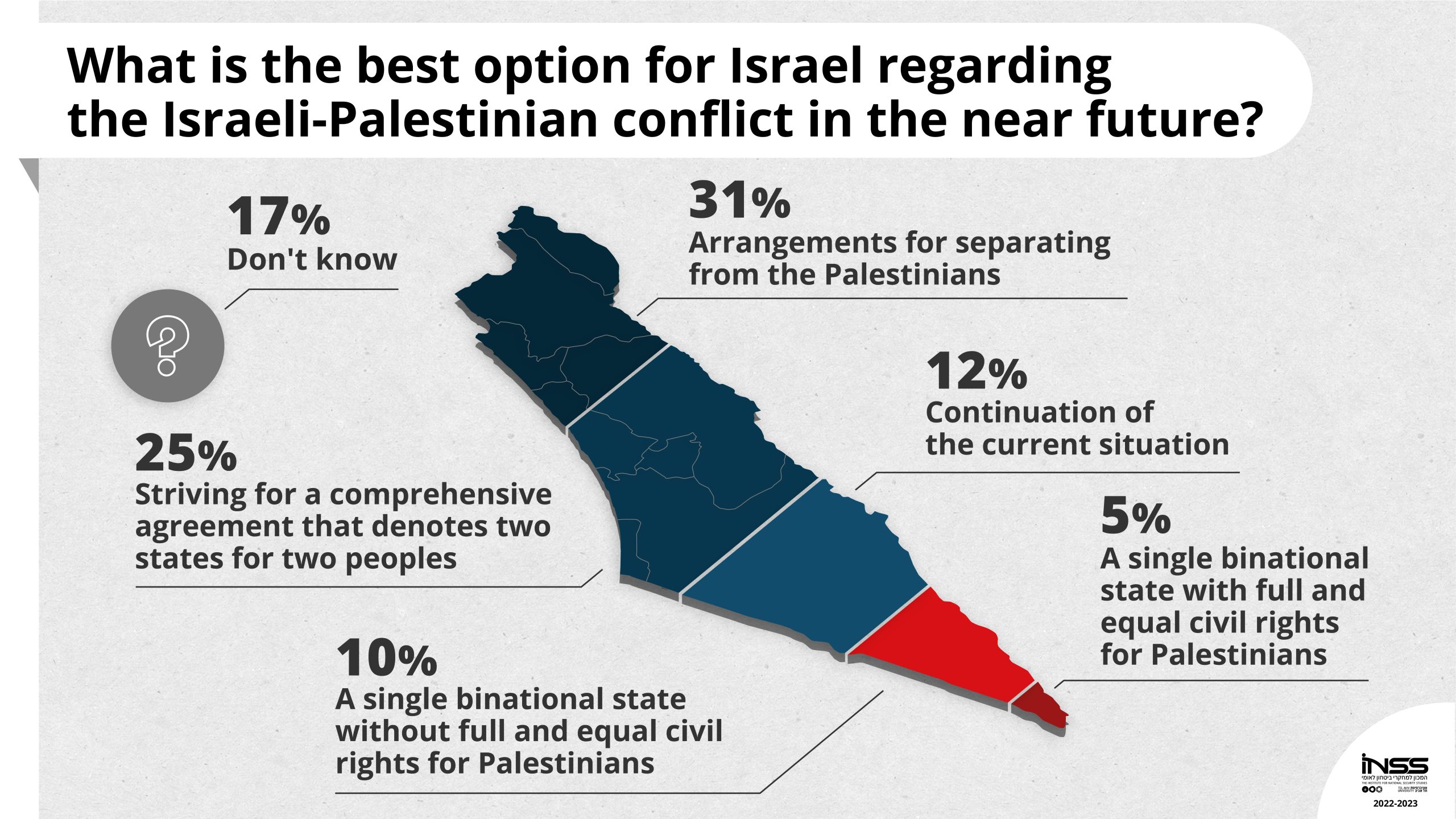
Regarding Israel’s policy on the Temple Mount, more than half of the public is in favor of Jews visiting the Temple Mount freely (55 percent of the Israeli public: 61 percent among Jews, 22 percent among Arabs), out of whom 16 percent of Israelis believe that Jews should also be allowed to pray on the Mount. A fifth of the public opposes Jews visiting the Temple Mount and 24 percent “don’t know.”
A significant portion of the public supported taking military action against the various security threats, even at the price of war. There was significant support for military activity against Iran and its proxies, even at the price of risking an escalation toward war. With respect to Hezbollah’s acquisition of precision missiles, a third of the public expressed support for the possibility of military action (34 percent), apparently perceiving it as a serious threat that should be dealt with even at the price of war; 28 percent preferred to strengthen Israel’s defensive capabilities through acquisition of additional air defense systems, and about a fifth of the public supported striving to reach an arrangement with the government of Lebanon with international mediation to stop the production of the missiles (18 percent).
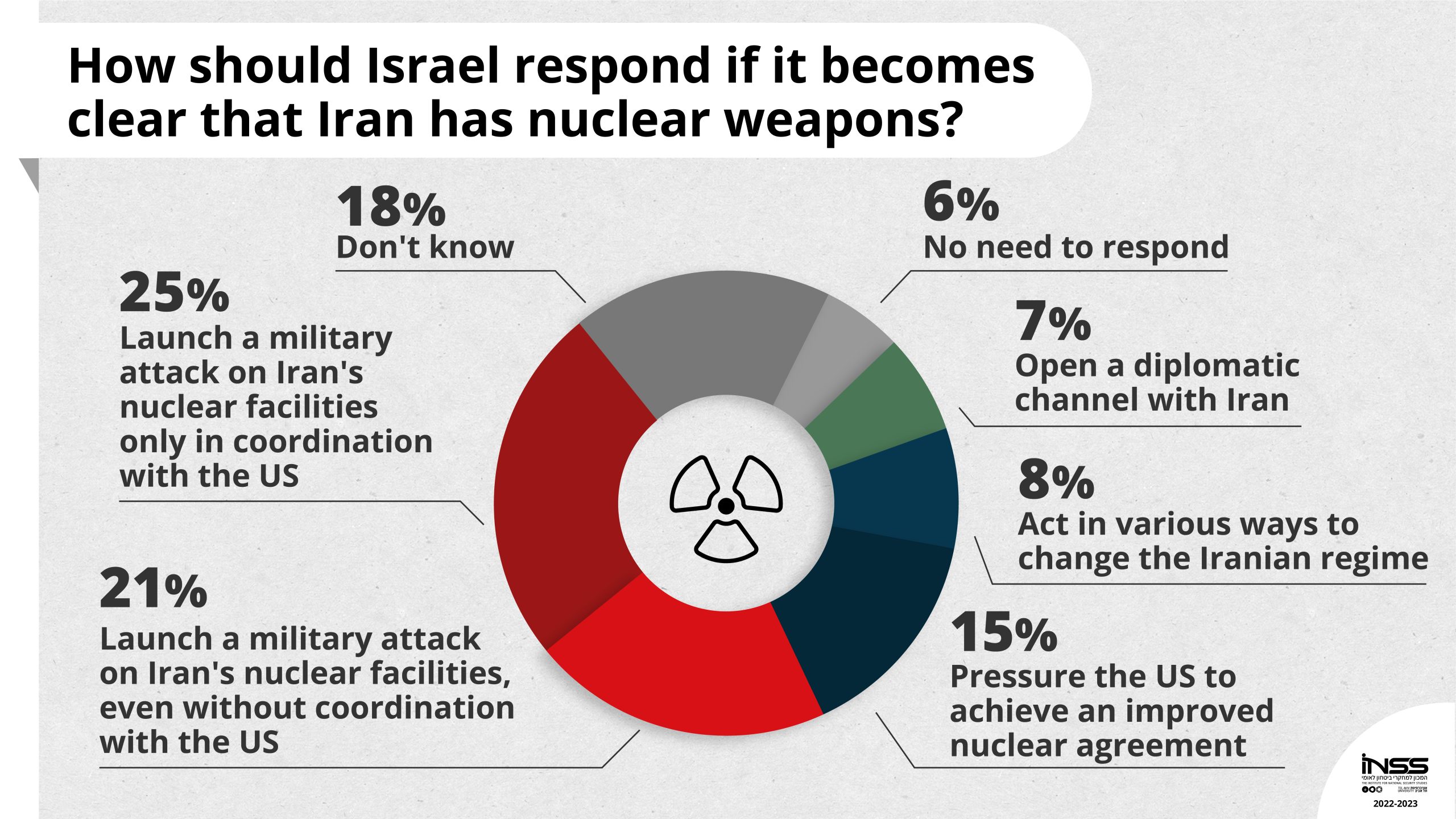
Furthermore, 46 percent of Israelis supported taking military action against Iran if it becomes clear that Iran has decided to cross the threshold and to produce a nuclear weapon. Similar to 2021, this year a fifth of the public supported such an action even without coordination with the United States (25 percent supported action in coordination with the United States, 21 percent supported action even without coordination). This year continued to see a moderate decline in public support for placing pressure on the United States to achieve an improved agreement with Iran, against the backdrop of the continued talks between the sides that reached a dead end (15 percent). There was also a low level of support for the possibility of working to bring about regime change in Iran (8 percent). Only a negligible minority believed that Israel should open a diplomatic channel with Iran (7 percent).
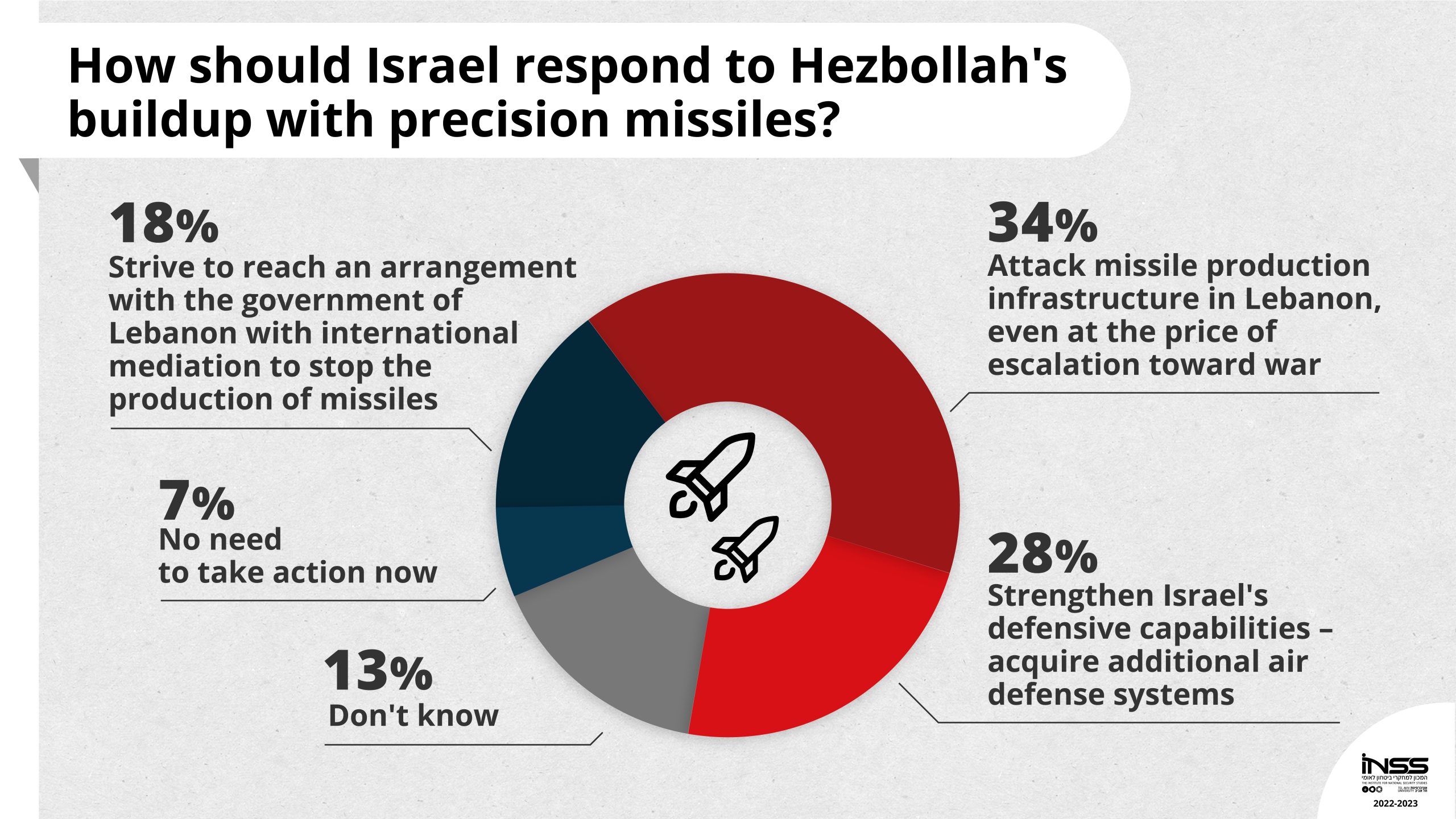
Israeli Involvement in Foreign and Defense Issues
Against the backdrop of the war in Ukraine and given the tension between the United States and Russia, the majority of the Israeli public support a relatively cautious approach that advocates non-intervention in the war (65 percent). A large majority of the public reject Israeli involvement in favor of Ukraine, such that could lead to a significant deterioration in Israel-Russia relations; only about one fifth of the public (19 percent) support adopting a clear political stance in favor of Ukraine. Of this latter group, the decisive majority support provision of civilian-humanitarian aid: 74 percent support provision of civilian aid, and 63 percent support provision of defensive weapons to Ukraine – even at the potential cost of damage to relations with Russia. Only 27 percent support providing offensive weapon systems; less than 2 percent expressed opposition to providing any aid at all (on this question, respondents were able to choose more than one option).
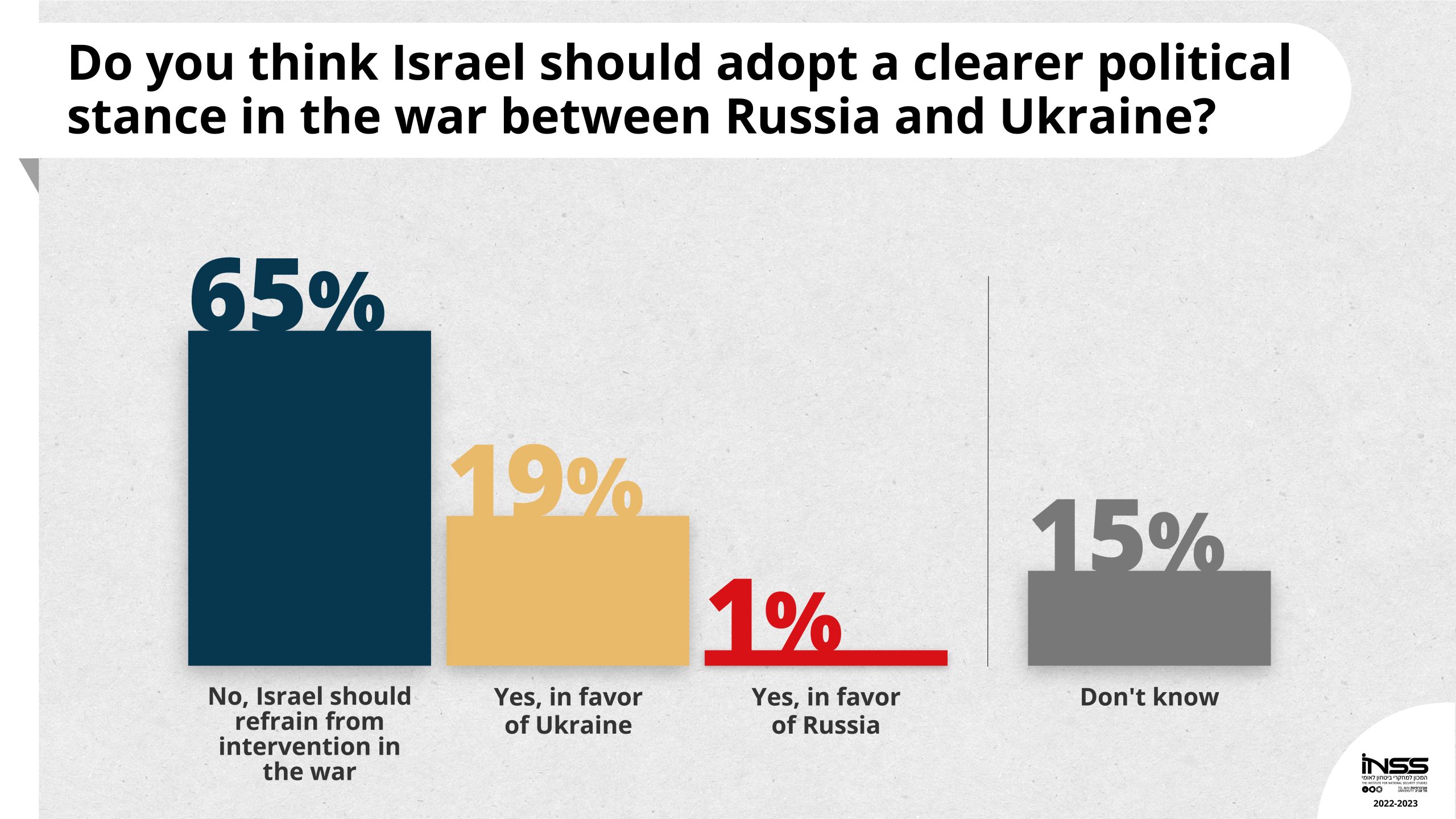
As for the increasing tension between the United States and China, more than half of the public (56 percent) believed that Israel should refrain, one way or another, from exporting technology to China, if the United States requests this of Israel. This figure corresponds with the finding that 71 percent of the public believe that in setting its policy Israel should take into account the needs and interests of the United States, in order to maintain the special relations, and the finding that less than half of the public (43 percent) believe that Israel can successfully cope with a reduction of United States support for Israel.
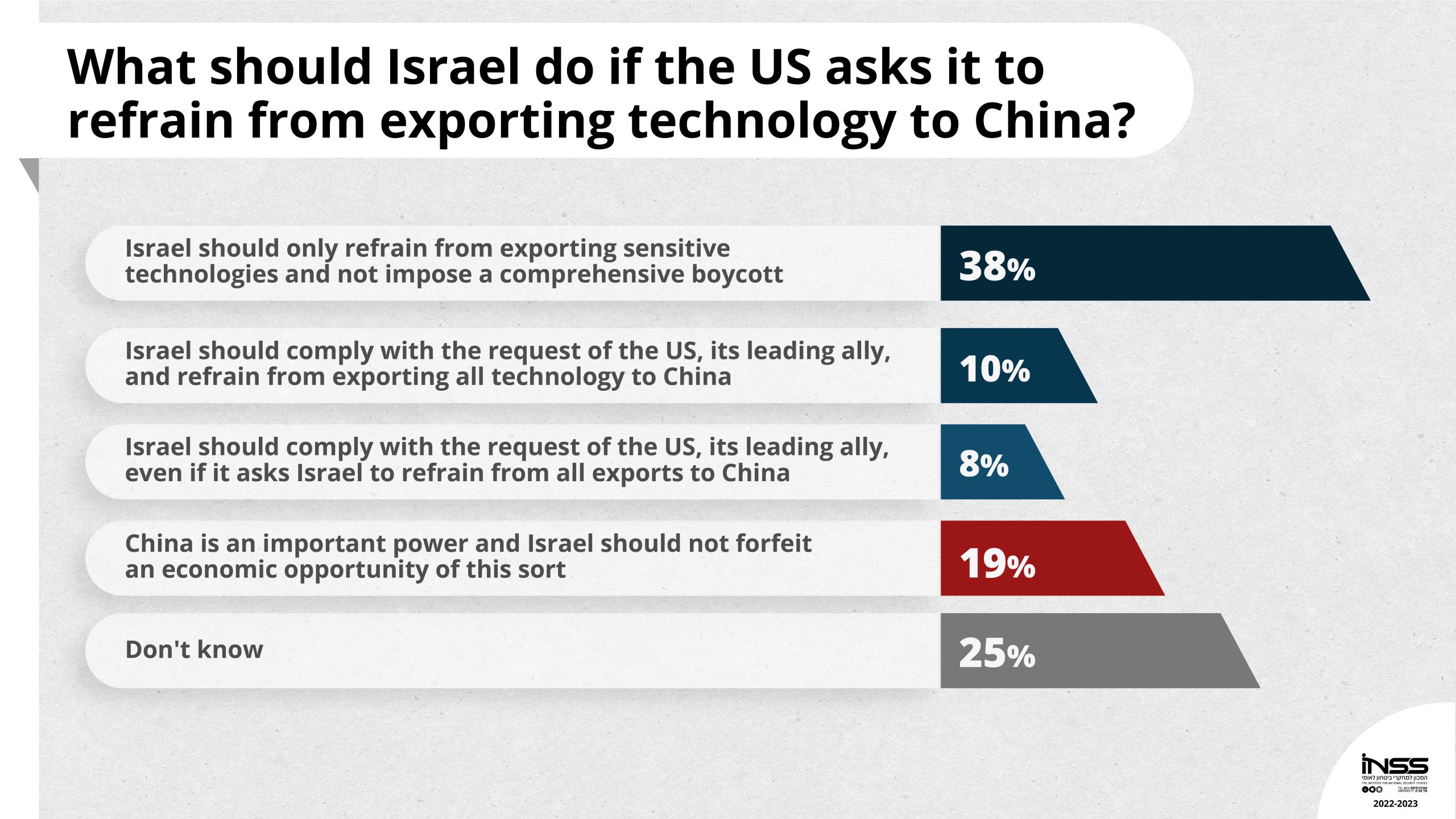
The Internal Social Challenges
In contrast with the public’s high level of confidence in the country’s ability to successfully cope with external threats, there was a low level of confidence and a decline compared to previous years regarding its ability to cope with internal threats. Only 32 percent of the public believed that the State of Israel can cope with corruption in the government establishment, in contrast with 40 percent last year. Only 36 percent believed that Israel can cope with the challenge of polarization between various sectors of society.
In addition, 61 percent of the public felt that there has been a weakening of the sense of solidarity in Israeli society during the past year. Nevertheless, an important figure from the current study, which should continue to be tracked, relates to the sense of belonging among Israel’s Arab citizens: 63 percent responded that the more important component of their identity is the Israeli component, more than the Palestinian (37 percent responded the Palestinian component), and the majority want to integrate within the society and State of Israel in one way or another: only 23 percent want to integrate as citizens with equal rights in the country, without any conditions, 20 percent see themselves as part of the Palestinian people but prefer to integrate in Israeli society, and another 20 percent want to integrate in Israeli society but are interested in changing the identity of the State of Israel to a state of all its citizens. Meanwhile, 6 percent are not at all interested in integrating in the State of Israel; about a third of the respondents (31 percent) responded “don’t know”.
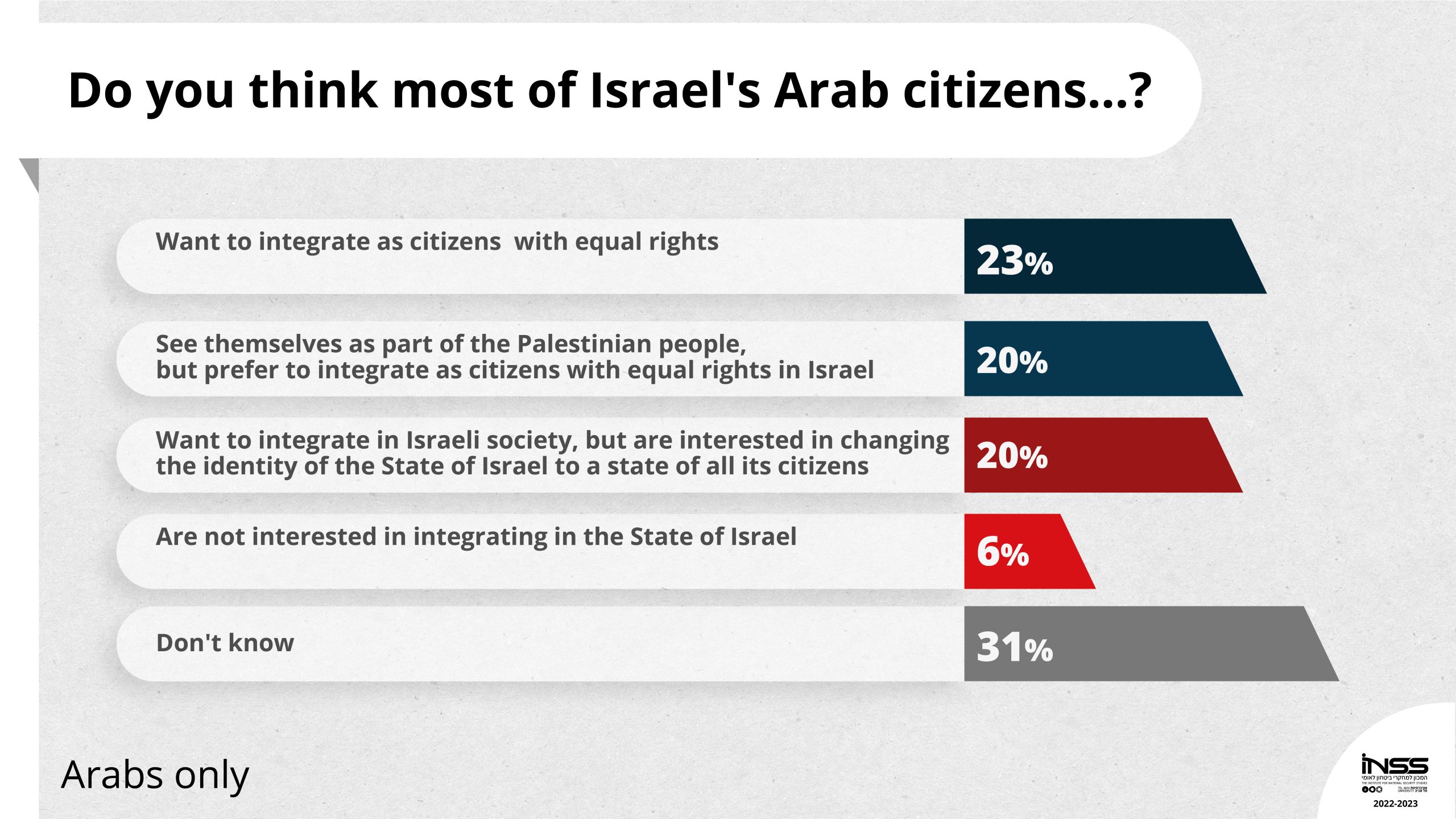
The Jewish population mainly sees Israel’s Arab citizens as people they should respect but also suspect (46 percent). A quarter of the Jewish population see Israel’s Arab citizens as citizens with equal rights (25 percent); more than a fifth identify them as potential enemies (22 percent); only a negligible minority do not see them as citizens with equal rights (7 percent) =. From an optimistic perspective, 74 percent of Israelis (Jewish and Arab) believe that the State of Israel should invest in its Arab citizens to one extent or another, in order to bridge the gaps between the sectors.
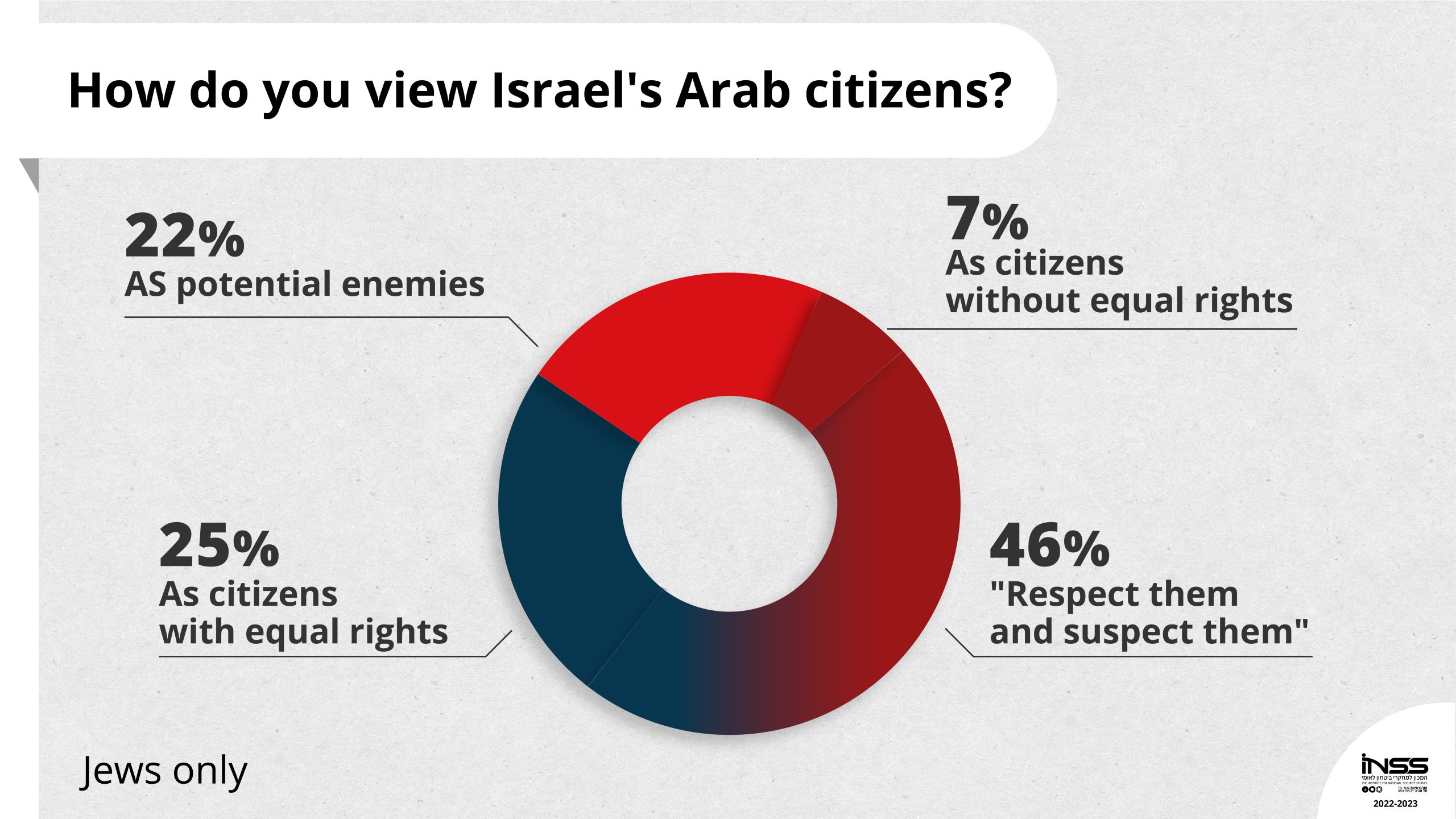
The Jewish and democratic character of the state continues to be a guiding light for Israel’s citizens. In the past few years, there has been increased support for the value “democratic state” as the most important Israeli value, and it reached a peak this year with 46 percent support (compared to 37 percent last year). This shows the expanded understanding among the general public regarding the level of importance of “democratic state” in its various contexts. Similar to last year, 35 percent placed the value “state with a Jewish majority” as the most important to them, and far behind them were the values “peace with our neighbors” (10 percent) and “the greater Land of Israel” (9 percent). Among the Jewish population, the value “a state with a Jewish majority” continues to be the most important value for them (42 percent). Despite the sense of decline of social solidarity that was recorded in the index, the public believes that “all of Israel is responsible for one another” (61 percent) and continues to believe this year too that regarding the threats and challenges facing Israel, “we can only rely on ourselves” (80 percent).
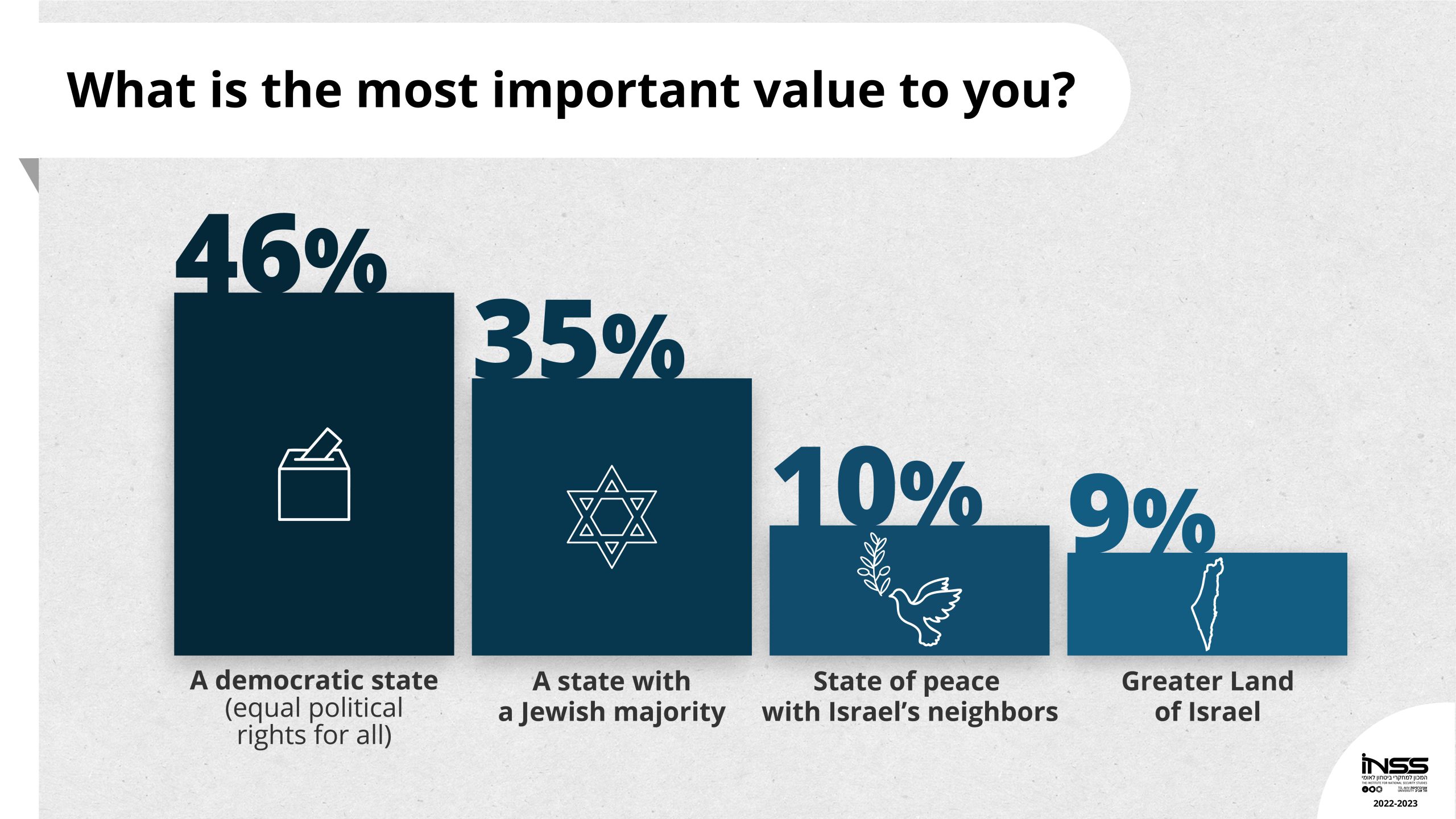
In conclusion, the figures from the National Security Index for 2022-2023 indicate that the Israeli public is troubled by internal challenges more than external challenges, and has less confidence that the state can successfully deal with these challenges. In terms of the security threats, the Palestinian arena is the one the public identifies as most threatening to its security, and the majority support separation from the Palestinians and establishing a demilitarized Palestinian state, without dividing Jerusalem and without the right of return. The public sees the threat of Hezbollah’s precision missiles as a serious one that requires action, but ranks the threat in the northern arena lower. In terms of Israeli foreign policy, the public recognizes the possible tension in trade with China and draws a clear line between defense exports of sensitive technologies and other exports. The public supports the current policy regarding the war in Ukraine and is not interested in adopting a political stance in favor of one of the sides; however, those who are in favor of a clear political stance backing Ukraine support providing civilian aid to Ukraine and aid that it sees as defensive. The public has a high level of confidence in Israel’s security organizations, but this confidence has declined over the years, and there is a steady decrease in the past two years in the Israeli public’s overall assessment of Israel’s national security situation.
_____________________
[1] The study is conducted by the INSS National Security and Public Opinion research program. The current survey was conducted in December 2022, comprising an internet questionnaire or telephone interviews among populations that do not have access to the internet. 1,208 respondents among the Jewish and the Arab populations were interviewed; this is a representative sample of the entire adult population in Israel age 18 and up. The maximum margin of error is ±2.8 percent at a 95 percent confidence level. The field work was done by the Midgam Institute, headed by Mano Geva.
[2] Until 2020 the respondents were asked to rank “at what level on the [national security] scale do you think the country is at today, from 1 to 10.” Starting in 2020 the question was changed so that respondents were asked to rank Israel’s national security situation today, on a scale of 1 to 10.
[3] Until 2020 the study was based on public opinion surveys conducted among a representative sample of the adult population of Israel through face-to-face interviews in the homes of the interviewees. Starting in 2020 the study has been based on public opinion surveys comprising internet questionnaires or telephone interviews among populations that do not have access to the internet conducted among a representative sample of the adult population in Israel.
[4] In the survey conducted in November 2021, the question was worded differently. Respondents were asked to choose the most serious external security threat to the State of Israel today, out of the following options: a nuclear Ian (23 percent); the Israeli-Palestinian conflict (21 percent); terrorist activity against Israel’s citizens in Israel and abroad (15 percent); the northern arena (Lebanon, Syria, Iraq, Iran) (13 percent); Hamas in Gaza (10 percent); political isolation and/or attempts to delegitimize Israel (7 percent). 11 percent responded “don’t know.”


